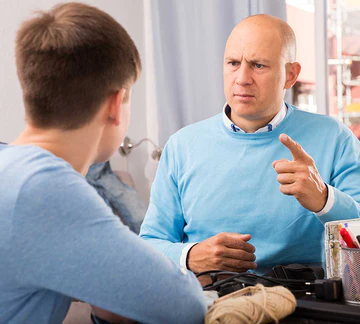Having a narcissistic father is undoubtably difficult to navigate. Their presence can be utterly overbearing—flitting between craving your attention to abusive behavior and even neglect.
Narcissistic fathers tend to be self-important, play the victim and use tactics like gaslighting.
If you have a narcissist father, you may be more likely to struggle with the following things: anger, chronic guilt, low self-esteem, codependency in other relationships, poor boundaries, being a people-pleaser, an inability to express or handle emotions, such as exploding into a temper, or worse; modeling narcissistic behaviors yourself.
You might even think that there’s nothing you can do about it…
It might seem counterintuitive and sound surprising, but not only can having a narcissistic father help you become a better person, but it gives you a superpower, and this article will show you exactly how…
But I’m here to show you that you can.
Throughout my three decades, I’ve worked with hundreds of victims of narcissists and narcissistic clients themselves, and I want to share how you can rewrite your future and break away from the identity of this toxic relationship.
You might even think that there’s nothing you can do about it…
But I’m here to show you that you can.
It might seem counterintuitive and sound surprising, but not only can having a narcissistic father help you become a better person, but it gives you a superpower, and this article will show you exactly how…
Throughout my three decades, I’ve worked with hundreds of victims of narcissists and narcissistic clients themselves, and I want to share how you can rewrite your future and break away from the identity of this toxic relationship.
What exactly is a narcissistic personality disorder?
I believe that when we understand something, it gives us our power back.
Before we begin to think about tackling a narcissistic relationship with our mother, we need to identify what narcissism means:
According to the Mayo Clinic, “A narcissistic personality disorder (NPD) is a complex mental health condition in which a person has an inflated sense of their own importance, a deep need for excessive attention and admiration, difficult relationships, and a lack of empathy for others. The person is also particularly sensitive to criticism, despite their high self-esteem. Bear in mind that abuse and narcissism are not always related. A diagnosis of NPD does not automatically translate to abusive behavior, and many people who engage in abuse do not have NPD.”
There are two main types of narcissists:
- Overt (grandiose) narcissists—the most obvious form of NPD. An overt narcissist is extroverted, socially charming, arrogant, and demanding. They are proud of their ability to manipulate and control others for their own gain, and their methods are clear and consistent.
- Covert (vulnerable) narcissist—the ‘shy’ narcissist. They generally lack confidence and use less open or direct methods of manipulation, which are often more difficult to detect. They tend to use passive aggression, guilt-tripping, and emotional manipulation.
A narcissistic personality disorder (NPD) causes problems in many areas of life, such as relationships, work, school, or financial matters. People with narcissistic personality disorder may be generally unhappy and disappointed when they’re not given the special favors or admiration they believe they deserve, and they end up projecting this onto their children.
When we arrive on the planet, our minds have one job: to keep us alive by keeping us safe. The trouble is, we rely on our parents to give us all our needs, and our parents are supposed to protect us. So if our main caregiver has narcissistic traits, more often than not, we grow up with unmet needs, conflicted belief systems about ourselves, our identity, and how we behave in the world and deal with setbacks.
Narcissistic Traits in Fathers

While not all narcissist fathers are necessarily abusive, how they treat their children may not come not from a place of love and care, or at least they believe they think they are parenting in a way that is right for them, but it’s not healthy for you.
You see, narcissists are not wired to parent in healthy ways.
Narcissist fathers tend to function to gain power and control.
They may be incredibly possessive of their children and feel threatened by their child developing any independence. If you have a narcissistic parent, you might generally experience humiliation and shame and grow up having poor self-esteem. Often, children of narcissists have a conflicted belief system about their identity and struggle with relationships.
Some other signs to look out for are: exaggerating and lying about himself, being self-centered, vain, and does not take criticism well. He might demand perfection and easily explode into rages.
If you think you are dealing with a narcissistic father, or you know someone who is, take a look at my tools that you can implement to claim back the freedom you deserve.
It’s Time Take Control and Be Empowered

Certainly, most people would not actively choose to have a parent with narcissistic personality disorder, but surprisingly a combination of resilient and fortunate positives could emerge if you find yourself in this unfortunate position…
Assert Your Boundaries
Narcissistic fathers often dictate to their children. But you get to choose when you want to see him. You can choose to visit at certain times that suit you and keep it limited. You get to choose when you respond to a phone call or message. When you reframe this, you get to step into your power.
Creating boundaries for yourself sends a message to your mind and to those around you that you matter. This level of self-care means you are no longer at the whim of other people’s behaviors andare now looking after yourself—something you may have never done before due to having a narcissistic parent.
Boundaries are essential to healthy relationships, and setting and sustaining boundaries is a skill you can acquire. When you set new boundaries, you must keep affirming them and making them familiar. This new skill requires practice until it becomes a natural habit.
Know That Having a Narcissistic Father Is Not Your Fault
So many of my clients grow up believing their parent’s behavior must be their fault. However, it’s even worse with a narcissistic parent, as they will often overtly blame you for everything that happens.
However, you must understand that this is a narcissistic trait and has nothing to do with you; yes, even if you are told repeatedly that it’s your fault, it’s not.
You may feel terrible guilt and have conflicting beliefs that keep pulling you back, so be mindful of these feelings and release the need to blame yourself.
Instead, choose to let go of guilt, blame, and be excited about your future.
Learn How To Find Compassion
Understand that hurt people, hurt people.
Unhappy people want to make those around them feel bad, and for a narcissist, this is, unfortunately, easier to do with their children.
Once you can take yourself out of the situation and away from their behavior, it opens up a great opportunity for forgiveness.
This forgiveness certainly doesn’t mean excusing their behavior; it simply means you can move on with your life knowing that you have the power to rewrite your future. Otherwise, your buried anger may also damage your health as resentment can build up and create stress hormones in your body, and the only person you harm and impact is yourself.
Despite it all, you now get to claim your power back by letting go and choosing to live in the present.
You can try this with three actions:
Acceptance—understand that you simply cannot change his behavior and that it’s okay.
Compassion—let go of blame and focus on yourself.
Move on—set yourself new goals that will push you forward in your life, and not go over the past anymore.
Take Full Responsibility for Your Life
Taking responsibility for your life is one of the biggest and most precious, powerful gifts you can give yourself.
While it’s important to find compassion and let go of blame, you must be very careful not to fall into victim mode.
You see, it’s very easy to blame your father for your upbringing and continue to carry this heavy load on into your adult life.
But let me ask you this…
Do you want to reflect on your life and realize your pathway was guided by resentment, anger, or hurt?
If you choose to have children, do you want to carry your pain onto them, or worse, model his behavior without being subconsciously aware you are doing it and make them feel what you did growing up?
Instead, take responsibility for what you can by choosing to work on and better yourself. Remember, you are in control of your life and can begin acting like it today.
Practice Self-Awareness
It sounds so easy on paper, doesn’t it? And logically, it makes sense…
However, we know that when his behavior triggers us, we can’t help but react…
You see, our go-to habits and behaviors work on our emotional state, it’s deep subconscious programming in your mind to keep you safe, so this is not your fault.
We have a conscious, “logical mind” and a subconscious, “feeling mind.” Our subconscious emotions and feelings will always defeat the logical part of our mind.
To change this, we must first practice self-awareness:
- Notice—what behaviors of his trigger you and where are you asserting your new boundaries.
- Breathe—count to ten, notice what you feel in your body, and write it down.
- Ask—before you react, ask yourself, “Will this help my future self?” If not, then you can try practicing self-awareness with my tools here.
Break the Cycle for Good

If all of this sounds like hard work, I have great news…
Remember that your mind is hardwired to find and return to what is familiar. Our subconscious minds are stubborn things, and breaking a habit takes practice, intentional action, and discipline, and this can be hard to do just by yourself.
However, I have created a powerful self-hypnosis audio to help: Coping with Narcissistic Fathers.
You’ll be able to receive all the nurture, praise, and confidence you’ve ever needed.
You’ll be able to release the need to always try to fix and repair the relationship with your father and start living life for yourself.
And recode that stubborn mind from its core to liberate yourself from your father’s hurt and discover how rewarding and thrilling it feels to re-create a new future for yourself.
You’ll be able to finally find inner peace and feel excited and empowered. If you are ready to learn how to redirect yourself into a tremendous sense of self-belief and no longer want to let the toxic relationship with your father define you, then try my Coping with Narcissistic Fathers self-hypnosis today.



